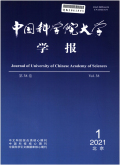中国科学院大学学报2024,Vol.41Issue(4):541-549,9.DOI:10.7523/j.ucas.2022.068
基于发射波束旁瓣零陷的低轨卫星干扰规避策略
Interference avoidance strategy for LEO satellite based on transmit beam sidelobe nulling
摘要
Abstract
With the rapid development of broadband low-orbit satellite systems,communication frequency bands such as Ku and Ka tend to be saturated gradually,and non-geostationary orbit(NGSO)satellites will inevitably cause interference to geostationary orbit(GSO)satellites operating at the same frequency.At present,a spatial isolation strategy is often adopted to avoid interference.NGSO satellites always produce the strongest interference to the collinear area.Increasing the isolation angle can reduce the interference,but it will greatly lose the coverage of the LEO satellite.This paper proposes an interference avoidance strategy based on sidelobe nulling of the transmit beam.The antenna array is divided into row and column elements by establishing the LEO satellite coordinate system.In the dimension of column elements,the robust LCMV algorithm is used to realize wide nulling.In the dimension of row elements,it is expanded in combination with beam direction,and finally forms a"null band"in the direction of the collinear area.Through simulation analysis,the proposed strategy can effectively reduce the interference avoidance isolation area of LEO satellites while avoiding collinear interference.The algorithm has low complexity and is easy to implement on satellites.关键词
低轨卫星/干扰规避/波束形成/旁瓣零陷Key words
LEO satellite/interference avoidance/beamforming/sidelobe nulling分类
信息技术与安全科学引用本文复制引用
王海旺,邹诚,常家超,邵丰伟,姜泉江,李国通..基于发射波束旁瓣零陷的低轨卫星干扰规避策略[J].中国科学院大学学报,2024,41(4):541-549,9.基金项目
第4批国家"万人计划"(WRJH19DH01)和上海市青年科技英才扬帆计划(19YF1446400)资助 (WRJH19DH01)

